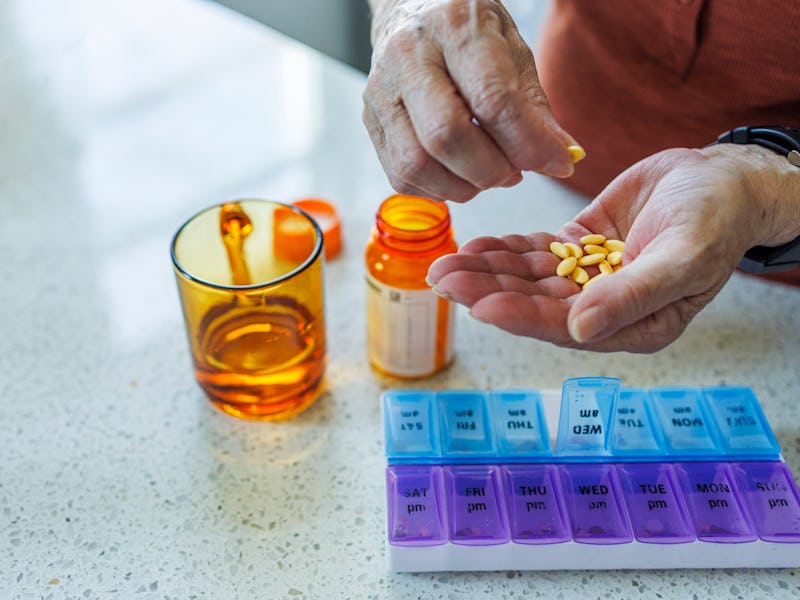Millions of Americans Are On Prescription Drugs That Can Increase the Risk for Heat-Related Illnesses
Countless medications may make users more heat sensitive, photo sensitive, and sweat more.

This summer is poised to be the hottest yet. But for the millions of people that take prescription drugs, it could be even hotter — due to inherent drug properties that make its users even more heat intolerant. There are many different medications that, through various mechanisms, can increase the risk for heat-related illnesses such as heat cramps, exhaustion, and stroke.
Too much sweating
Sweating is one bodily process that can be affected by certain drugs. The mechanism is crucial for keeping the body cool, and is controlled by a special area of the brain called the thermoregulatory center. But certain drugs can impair this area and as a result, the process of sweating. The most common drugs that impair sweating are those that are anticholinergic––those that block the action of the neurotransmitter acetylcholine.
Many common drugs are anticholinergic or have anticholinergic properties: nausea medications, antipsychotics, seizure drugs like Topamax, certain antidepressants, and even antihistamines like Benadryl. And not being able to cool down appropriately can make your body overheat.
On the flip side, certain drugs can cause too much sweating. Excessive perspiration is a common side effect of antidepressants like sertraline (known by its brand name Zoloft). It is common enough that it’s warranted its own name of antidepressant-induced excessive sweating (ADIES). However, both legal (i.e. Adderall and Vyvanse) and illegal amphetamines (i.e. cocaine and ecstasy) also fall into this category. Excessive sweating, also known as hyperhidrosis, can lead to more problems down the line.
“If you have excessive sweating, that can lead to potentially dehydration and electrolyte problems, which is going to increase the risk for overheating yourself and can also lead to what we call acute kidney injury,” says Kenneth Mueller, a pharmacist and professor at the Emory School of Nursing. It can also result in heat exhaustion, due to excessive water loss.
Sun sensitivity
Various drugs can also increase risk for drug-induced photosensitivity — that is, you have a higher risk of sunburn. According to the Food and Drug Administration, certain types of antibiotics and antifungals fall under this category, as do various oral contraceptives and non-steroidal anti-inflammatory drugs like ibuprofen. And sunburns can also indirectly alter one’s ability to sweat, Mueller says.
There can also be a cognitive aspect at play. Central nervous system depressives like alcohol, opioids, or benzodiazepines could delay one’s cognitive awareness that they’re overheating.
“Typically, if you're overheating, naturally, you're going to seek shade, you're going to hydrate,” Mueller says. “These are kind of cognitive things that your body is going to do, and tell you to do.” But if you’re taking these drugs, you might not be fully aware that you’re overheating, and thus will not take the proper precautions. In a similar vein, there are drugs that can impair your thirst perception ability so you may not recognize when you’re thirsty. Certain antidepressants, seizure drugs, and diuretics have these properties.
The Centers for Disease Control and Prevention also lists other medication mechanisms that could contribute to heat sensitivity: certain drugs can reduce blood vessel dilation, lead to an electrolyte imbalance, or in general increase the risk of fainting.
Many users take multiple medications, which Mueller explains can compound the effects of each one.
“As you bring on more medications, you're kind of hitting multiple different pathways,” Mueller says. (He also notes that the “triple whammy” of certain blood pressure medications, diuretics, and non-steroidal anti-inflammatory drugs like Ibuprofen can increase the risk of kidney injury during heat).
Should you stop your medication?
Given that there are hundreds of drugs that can impact heat sensitivity in some way or another, it’s not always practical to just avoid them altogether. Mueller emphasized that certain populations are at higher risk than others. Particularly vulnerable people are older adults, infants, children, outdoor workers, athletes, and those with chronic conditions. Migrant farm workers are also especially at risk––recent data suggests they are 35 times more likely to die from heat-related illness compared to the average population.
Mueller says these vulnerable populations — and really anyone — should be aware of signs and symptoms of heat-related illness, as well as how to mitigate them through rest, shade, and hydration.
And regardless, medication takers should not stop taking drugs without talking it through with a professional.
“Stopping any medication cold turkey could have unintended consequences,” Mueller said. “I always tell people, in general, if you're going to change medication therapy, you need to have a game plan with a prescriber.”